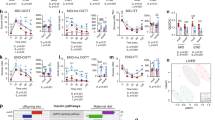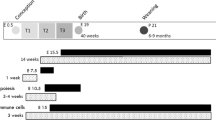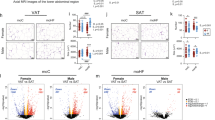Abstract
Maternal obesity can program offspring metabolism across multiple generations. It is not known whether multigenerational effects reflect true inheritance of the induced phenotype, or are due to serial propagation of the phenotype through repeated exposure to a compromised gestational milieu. Here we sought to distinguish these possibilities, using the Avy mouse model of maternal obesity. In this model, F1 sons of obese dams display a predisposition to hepatic insulin resistance, which remains latent unless the offspring are challenged with a Western diet. We find that F2 grandsons and F3 great grandsons of obese dams also carry the latent predisposition to metabolic dysfunction, but remain metabolically normal on a healthy diet. Given that the breeding animals giving rise to F2 and F3 were maintained on a healthy diet, the latency of the phenotype permits exclusion of serial programming; we also confirmed that F1 females remained metabolically healthy during pregnancy. Molecular analyses of male descendants identified upregulation of hepatic Apoa4 as a consistent signature of the latent phenotype across all generations. Our results exclude serial programming as a factor in transmission of the metabolic phenotype induced by ancestral maternal obesity, and indicate inheritance through the germline, probably via some form of epigenetic inheritance.
This is a preview of subscription content, access via your institution
Access options
Subscribe to this journal
Receive 12 print issues and online access
$259.00 per year
only $21.58 per issue
Buy this article
- Purchase on Springer Link
- Instant access to full article PDF
Prices may be subject to local taxes which are calculated during checkout


Similar content being viewed by others
References
Hanson MA, Gluckman PD . Early developmental conditioning of later health and disease: physiology or pathophysiology? Physiol Rev 2014; 94: 1027–1076.
Aiken CE, Ozanne SE . Transgenerational developmental programming. Hum Reprod Update 2014; 20: 63–75.
Fernandez-Twinn DS, Constancia M, Ozanne SE . Intergenerational epigenetic inheritance in models of developmental programming of adult disease. Semin Cell Dev Biol 2015; 43: 85–95.
Li CC, Young PE, Maloney CA, Eaton SA, Cowley MJ, Buckland ME et al. Maternal obesity and diabetes induces latent metabolic defects and widespread epigenetic changes in isogenic mice. Epigenetics 2013; 8: 602–611.
Cropley JE, Eaton SA, Aiken A, Young PE, Giannoulatou E, Ho JW et al. Male-lineage transmission of an acquired metabolic phenotype induced by grand-paternal obesity. Mol Metab 2016; 5: 699–708.
Wolff GL, Roberts DW, Mountjoy KG . Physiological consequences of ectopic agouti gene expression: the yellow obese mouse syndrome. Physiol Genomics 1999; 1: 151–163.
Hanniman EA, Lambert G, Inoue Y, Gonzalez FJ, Sinal CJ . Apolipoprotein A-IV is regulated by nutritional and metabolic stress: involvement of glucocorticoids, HNF-4 alpha, and PGC-1 alpha. J Lipid Res 2006; 47: 2503–2514.
VerHague MA, Cheng D, Weinberg RB, Shelness GS . Apolipoprotein A-IV expression in mouse liver enhances triglyceride secretion and reduces hepatic lipid content by promoting very low density lipoprotein particle expansion. Arterioscler Thromb Vasc Biol 2013; 33: 2501–2508.
Cannon MV, Buchner DA, Hester J, Miller H, Sehayek E, Nadeau JH et al. Maternal nutrition induces pervasive gene expression changes but no detectable DNA methylation differences in the liver of adult offspring. PLoS One 2014; 9: e90335.
Carone BR, Fauquier L, Habib N, Shea JM, Hart CE, Li R et al. Paternally induced transgenerational environmental reprogramming of metabolic gene expression in mammals. Cell 2011; 143: 1084–1096.
Barres R, Zierath JR . The role of diet and exercise in the transgenerational epigenetic landscape of T2DM. Nat Rev Endocrinol 2016; 12: 441–451.
Acknowledgements
JEC is supported by an Australian Research Council DECRA (DE120100723). CMS was supported by an Australian Research Council Future Fellowship (FT120100097). This study was supported in part by a Diabetes Australia Research Trust grant-in-aid.
Author contributions
SAE designed and performed experiments, analysed data and drafted the manuscript. AJA performed experiments. PEY performed experiments and analysed data. JWKH analysed data. JEC conceived and designed experiments, analysed and interpreted data and drafted the manuscript. CMS conceived and designed experiments, interpreted data and drafted the manuscript. All authors critically revised the paper and approved the final version.
Author information
Authors and Affiliations
Corresponding author
Ethics declarations
Competing interests
The authors declare no conflict of interest.
Additional information
Supplementary Information accompanies this paper on International Journal of Obesity website
Rights and permissions
About this article
Cite this article
Eaton, S., Aiken, A., Young, P. et al. Maternal obesity heritably perturbs offspring metabolism for three generations without serial programming. Int J Obes 42, 911–914 (2018). https://doi.org/10.1038/ijo.2017.247
Received:
Revised:
Accepted:
Published:
Issue Date:
DOI: https://doi.org/10.1038/ijo.2017.247



